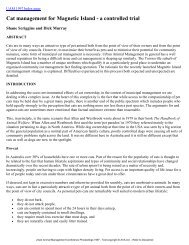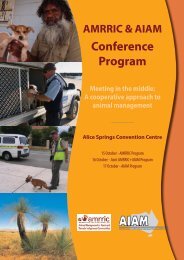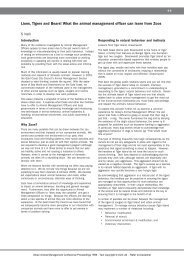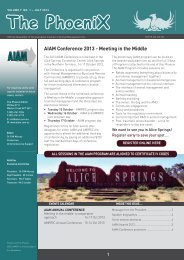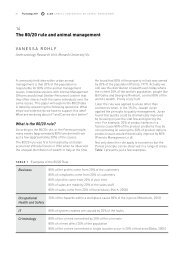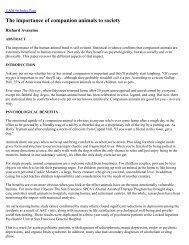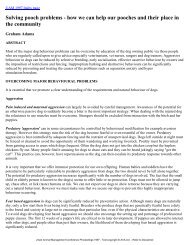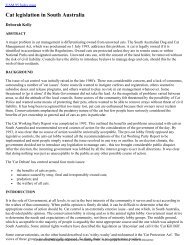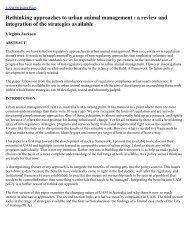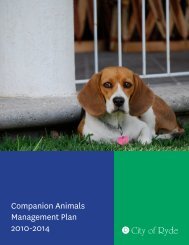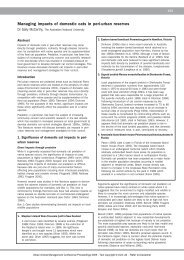Proceedings OF ThE - Australian Institute of Animal Management Inc
Proceedings OF ThE - Australian Institute of Animal Management Inc
Proceedings OF ThE - Australian Institute of Animal Management Inc
You also want an ePaper? Increase the reach of your titles
YUMPU automatically turns print PDFs into web optimized ePapers that Google loves.
88 <strong>Proceedings</strong> 2012<br />
AIAM Annual Conference on <strong>Animal</strong> <strong>Management</strong><br />
15<br />
Compliance audits <strong>of</strong> Local Governments by the dog and cat<br />
management board<br />
Danielle Suckley<br />
Dog and Cat <strong>Management</strong> Board, SA<br />
The Dog and Cat <strong>Management</strong> Board (the Board) is a<br />
statutory authority established under the Dog and Cat<br />
<strong>Management</strong> Act 1995 (the Act). In 2005 the Minister <strong>of</strong><br />
Local Government requested that the Department <strong>of</strong><br />
Environment and Heritage undertake a review <strong>of</strong> the<br />
operations <strong>of</strong> the Board. The findings <strong>of</strong> the review<br />
included a recommendation that the Board should<br />
‘undertake spot checks <strong>of</strong> all Councils with the aim <strong>of</strong><br />
covering all Councils within a five year period’.<br />
This finding was accepted and a five-year auditing<br />
cycle <strong>of</strong> the 69 local governments in South Australia<br />
was established. The aim <strong>of</strong> the audits is to<br />
measure the level <strong>of</strong> compliance with the Dog and Cat<br />
<strong>Management</strong> Act 1995 and provide assistance, advice<br />
and support where improvements are needed.<br />
The audits inform the Board so it is better able<br />
to fulfil its functions under the Section 21 <strong>of</strong> the<br />
Act which includes:<br />
21—Functions <strong>of</strong> Board<br />
(1) The Board has the following functions:<br />
(a) to plan for, promote, and provide advice<br />
about, the effective management <strong>of</strong> dogs and<br />
cats throughout South Australia;<br />
(b) to oversee the administration and<br />
enforcement <strong>of</strong> the provisions <strong>of</strong> this Act<br />
relating to dogs, including—<br />
(i) monitoring the administration and<br />
enforcement <strong>of</strong> this Act by councils; and<br />
(ii) issuing guidelines and providing advice<br />
to councils about—<br />
(A) planning for the effective<br />
management <strong>of</strong> dogs;<br />
(B) training for dog management <strong>of</strong>ficers;<br />
(C) the appropriate level <strong>of</strong> administration<br />
and enforcement in the circumstances<br />
prevailing in the area;<br />
(D) the issuing <strong>of</strong> orders or related<br />
directions under this Act;<br />
(E) the standard <strong>of</strong> facilities used for the<br />
detention <strong>of</strong> dogs under this Act;<br />
(F) the keeping <strong>of</strong> registers under this<br />
Act and the issuing <strong>of</strong> certificates <strong>of</strong><br />
registration and registration discs;<br />
(G) any other matter related to the<br />
administration or enforcement <strong>of</strong> the<br />
provisions <strong>of</strong> this Act relating to dogs;<br />
A long-term goal <strong>of</strong> the audits is to increase<br />
compliance throughout the state and ensure that there<br />
is consistency in dog and cat management across<br />
jurisdictions. Audits are also <strong>of</strong> significant benefit to<br />
the Board as they provide ‘real world’ examples <strong>of</strong><br />
how legislation is administered and identify where<br />
education and support will be most effective. An<br />
increased understanding is helpful in the development<br />
<strong>of</strong> policies and guidelines and accurate, evidence<br />
based information is also critical when providing<br />
advice to the Minister for Sustainability, Environment<br />
and Conservation. The Board also responds to<br />
media and public enquiries in relation to dog and<br />
cat management issues. This requires an accurate<br />
understanding <strong>of</strong> council procedures, administration<br />
and capabilities.<br />
The first round <strong>of</strong> audits was completed in 2006 and<br />
the second round is currently being finalised. The<br />
Board has decided to audit every three years from<br />
2012. This will ensure that audits are sufficiently<br />
frequent to follow up on non-compliance. A three<br />
year audit cycle will also identify policy gaps that<br />
arise due to changes in legislation or emerging<br />
issues. In addition to compliance, the audit examines<br />
financial records relating to councils contributions<br />
to the dog and cat management fund. The financial<br />
section <strong>of</strong> the audit is outsourced as the expertise to<br />
assess financial information does not currently exist<br />
in-house. The compliance and financial audits are<br />
conducted at the same time so that the council only<br />
receives one visit per audit cycle. It is important that<br />
Board staff attends the council to audit so that record<br />
maintenance and operations are sighted. The audit<br />
procedure is transparent and councils have access to<br />
the assessment tool prior to the site visit.<br />
During audits Board staff and the financial auditor<br />
use an audit checklist. The checklist is a Board<br />
approved policy document which sets out each <strong>of</strong> the<br />
areas where councils must be compliant under the<br />
Act. The checklist also has standard questions so<br />
that assessment is consistent and non-compliances<br />
can be quantified as part <strong>of</strong> the review process. The<br />
audit checklist covers the following areas <strong>of</strong> animal<br />
management:



